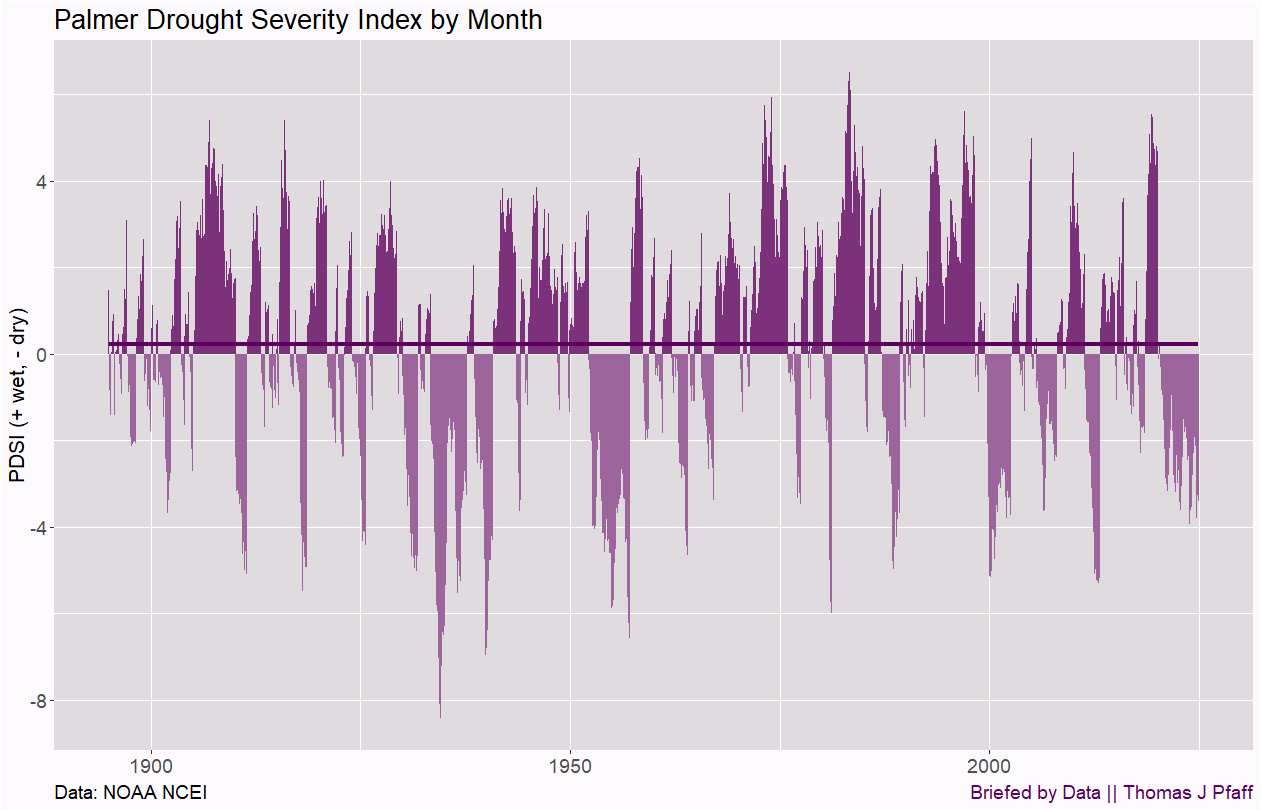There is nothing more aggravating to me than BS and the media misleading people. Before I get started, let me state that I am not a climate denier. I think the evidence that greenhouse gases are and will continue to warm the planet is solid. We can dither over projections, but warming has and will continue to happen. There will be negative consequences.
With that said, Gallap has a report, The Next Wave: Gen Z's Perspective on Water and Climate (no date on the page), that I won’t download or read because most people are only going to look at the highly misleading chart on the landing page, Figure 1.

Wow, for example, 36% of Gen Z, roughly ages 13-30, have experienced a drought. The problem with every single one of those questions is that they are not new or unique events caused by climate change. One of the problems with understanding climate change is that for the list in the poll, these are events that are expected to get worse or increase, but they exist without climate change. One way to think about this is that the 100-year flood becomes the 50-year flood with the help of climate change. In other words, the chance of a bad flood doubles.
I can see people reacting to this chart as, “How terrible, a third of Gen Z is experiencing drought; this is outrageous and frightening.” The real question for all these issues in the poll is, are they getting worse? Let’s go to the data.
We can get good data on drought in the U.S. Let’s start with the 25 years of data provided by the U.S. Drought Monitor. They have five levels of drought from D0 to D4: abnormally dry, moderate drought, severe drought, extreme drought, and exceptional drought.
Figure 2 is the percentage of the continental U.S. in at least severe drought, D2-D4, each week from January 2000 through January 2025. The regression line has a p-value of 0.165 and an R² of 0.00015. In other words, there has been no change over the last 25 years in the percentage of the continental U.S. in at least severe.

Surely, there has been an increase in extreme or exceptional drought. Nope. Figure 3 has that data with a regression with a p-value of 0.503 and an R² of 0.0003. Again, no change over the last 25 years.

But of course drought had gotten worse over the last 100 years. Luckily we have some data. The Palmer Drought Severity Index (PDSI) is defined as:
The Palmer Drought Severity Index (PDSI) uses readily available temperature and precipitation data to estimate relative dryness. It is a standardized index that generally spans -10 (dry) to +10 (wet). Maps of operational agencies like NOAA typically show a range of -4 to +4, but more extreme values are possible. The PDSI has been reasonably successful at quantifying long-term drought. As it uses temperature data and a physical water balance model, it can capture the basic effect of global warming on drought through changes in potential evapotranspiration. Monthly PDSI values do not capture droughts on time scales less than about 12 months; more pros and cons are discussed in the Expert Guidance.
NOAA has data from 1895 through 2024, and it is in Figure 4. The p-value for the regression line is 0.991 with an R² of 0.0000. No change over 130 years. As far as I can tell, Gen Z is experiencing the same amount of drought as any generation.

But wait, what about the LA wildfires? Climate change likely increased the chances of it happening, but so did more houses, water management issues, and an inability to do controlled burns to reduce fuel in the forests. Are we going to blame the Dust Bowl on climate change?
Why did Gallup create this BS report with this “data” on the landing page? Push a narrative? Clickbait? Pandering to Gen Z? Take your pick. Asking Gen Z, or any group of people, the questions in the poll has zero value other than trying to connect every event with climate change, which isn’t true. If you can make the case that one of these has gotten worse, then make that case. I’ve debunked drought, although this doesn’t mean drought won’t get worse in the future.
Beyond being nonsense, misleading the public is dangerous, as at some point, why would anyone believe the media (hmm, I wonder if that has already happened)? The media and science have to be brutally honest about what they know and don’t know; being political as they have been destroys their credibility. There has been an effort for some time now to hype climate change to positive effect, although we do have a generation that is depressed and afraid of the future. Meanwhile, we aren’t making smart decisions for the future.
Please share and like
Sharing and liking posts attracts new readers and boosts algorithm performance. I appreciate everything you do to support Briefed by Data.
Comments
Please let me know if you believe I expressed something incorrectly or misinterpreted the data. I'd rather know the truth and understand the world than be correct. I welcome comments and disagreement. We should all be forced to express our opinions and change our minds, but we should also know how to respectfully disagree and move on. Send me article ideas, feedback, or other thoughts at briefedbydata@substack.com.
Bio
I am a tenured mathematics professor at Ithaca College (PhD Math: Stochastic Processes, MS Applied Statistics, MS Math, BS Math, BS Exercise Science), and I consider myself an accidental academic (opinions are my own). I'm a gardener, drummer, rower, runner, inline skater, 46er, and R user. I’ve written the textbooks “R for College Mathematics and Statistics” and “Applied Calculus with R.” I welcome any collaborations.




